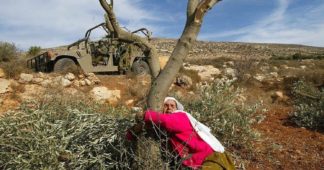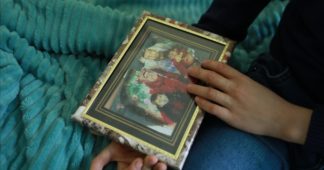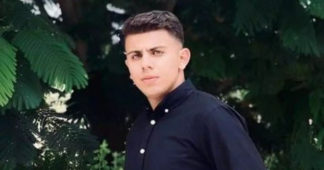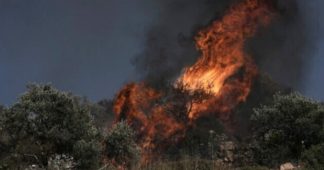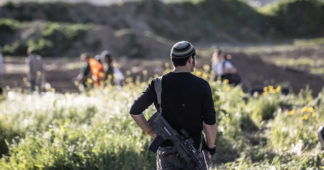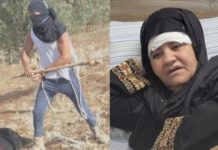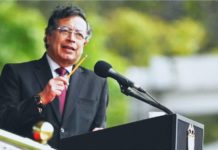By Fayha Shalash* – Ramallah
Oct 23, 2025
For 15 years, Abu Saleh had been going to his land in Turmusayya without incident. But this year, he was caught off guard by a brutal settler assault.
“Like someone who has just emerged from the jaws of death,” is how Ayman Abu Saleh described what he experienced a few days ago, when dozens of illegal Israeli Jewish settlers attacked him as he attempted to harvest his olive trees in the town of Turmusayya, north of Ramallah.
The attack, which injured Ayman, his elderly female cousin, a foreign activist, and several other Palestinians, was not an isolated incident during this year’s olive harvest season.
According to the Wall and Settlement Resistance Commission, there have been 158 attacks on Palestinians as they tried to harvest their trees — a season considered vital for West Bank residents and a primary source of livelihood for thousands of families.
The Commission reported that the Israeli army participated in 17 attacks, while settlers carried out 141, as of the time of writing. The violations are daily and ongoing.
The attacks ranged from violent physical assaults and detention campaigns to movement restrictions, denial of access, intimidation, and direct gunfire. They were concentrated mainly in Nablus, with 56 attacks, followed by Ramallah with 51, and Hebron (Al-Khalil) with 15.
This is the settler—allegedly a leader in the area—who blocked our path, holding a gun, right when we set out on Sunday. Then later, when the IDF promised us passage before jetting off, he was there on his ATV right next to them, waiting. Then the hordes came. pic.twitter.com/p8XhgfqS3j
— jasper nathaniel (@infinite_jaz) October 21, 2025
“This season is the most difficult and dangerous in recent decades,” the Commission said in a statement issued on Tuesday, “given the army and settlers’ exploitation of wartime regulations to commit crimes, supported by numerous policies and legislation that promote attacks, terrorism, and harassment, particularly the closure of cities, the arming of settlers, and, most dangerously, their exemption from accountability and trial.”
On Sunday morning, Ayman, 47, went to harvest olive trees in Turmusayya after the Israeli army had uprooted more than 500 of his trees in his hometown of Al-Mughayyir, east of Ramallah.
For 15 years, Abu Saleh had been going to his land in Turmusayya without incident. But this year, he was caught off guard by a brutal settler assault. After arriving with his brother’s wife and his elderly cousin, Umm Saleh, he was surrounded by more than 45 masked settlers who attacked them with batons and stones.
“I was far from Umm Saleh and my brother’s wife, so I got into my car, trying to escape,” he told the Palestine Chronicle. “But they attacked the vehicle, smashed its windows, damaged its tires, and began trying to drag me out of the door.”
Ayman moved to the other side and tried to flee, but they surrounded him and beat him with batons on his hands, legs, and chest. Then they threw stones at him as he managed to escape from the car.
“I didn’t think I had any chance of getting away,” he said. “Their sticks had nails embedded in them, piercing my body. I suffered severe bruises from the beatings and stones.”
At the same time, the settlers attacked Umm Saleh, beating her on the head with batons, even though they knew she was elderly. She was later taken to the hospital and spent two days in intensive care.
The Israeli army was present during the attack. The Palestinians initially assumed that the soldiers would intervene to stop the settlers, but the opposite happened. The soldiers did nothing.
Ayman is now forbidden from accessing his land in Turmusayya, as well as his land in Al-Mughayyir. All he has left are the two olive trees he planted in front of his house.
“Our entire village is surrounded by settlements. All we have left are our homes. There is no land, no trees, and they don’t want us to have anything left,” Ayman concluded.
Initiatives despite Difficulties
The United Nations Office for the Coordination of Humanitarian Affairs (OCHA) documented 71 settler attacks in the West Bank between October 7 and 13, half of them related to the olive harvest.
In a statement, OCHA said that settlers attacked Palestinians in 27 villages across the West Bank, resulting in injuries and property damage. These attacks included assaulting farmers, stealing crops and equipment, and vandalizing olive trees.
Since October 2023, settlers have carried out a total of 7,154 attacks against Palestinians and their property, resulting in the deaths of 33 Palestinians and the uprooting, destruction, and damage of 48,728 trees, including 37,237 olive trees, according to the Settlement and Wall Resistance Commission.
Since the beginning of the current olive harvest season, olive-planted lands have been subjected to 74 attacks, including 29 incidents of uprooting, breaking, and land-leveling, leading to the destruction of a total of 795 trees.
Despite the many challenges Palestinians face in accessing their lands, several local campaigns have been launched to assist residents — among them the “Olive 25” campaign, which aims to reach lands that others cannot.
Activist Abdullah Abu Rahma, one of the campaign’s organizers, told us that the olive tree resists alongside its owner and remains the strongest symbol of Palestinian identity.
“The goal of the attacks on the olive harvest is to sever the connection between the tree and the farmer, so that they can destroy the trees and seize the land to expand their settlements,” Abu Rahma explained.
“The Palestinians’ persistence and defiance in reaching their land is met with brutality and criminality from the settler militias, who seek every day to sever this close connection,” he added.
As part of the campaign, activists travel daily to lands threatened with confiscation to help residents reach them. However, they are routinely subjected to settler attacks under army protection.
“The settlers wait for us to attack us, and then the soldiers arrive and flood the area with tear gas,” Abu Rahma said. “Despite this, we have managed to reach lands whose owners haven’t set foot on them for more than 10 years.”
Palestinians continue to hold on to their land with hope, faith, and determination — knowing that their lives are inseparable from it, and that they will never abandon it, no matter how overwhelming the challenges.
*Fayha’ Shalash is a Ramallah-based Palestinian journalist. She graduated from Birzeit University in 2008 and she has been working as a reporter and broadcaster ever since. Her articles appeared in several online publications. She contributed this article to The Palestine Chronicle.
(The Palestine Chronicle)
.
We remind our readers that publication of articles on our site does not mean that we agree with what is written. Our policy is to publish anything which we consider of interest, so as to assist our readers in forming their opinions. Sometimes we even publish articles with which we totally disagree, since we believe it is important for our readers to be informed on as wide a spectrum of views as possible.
